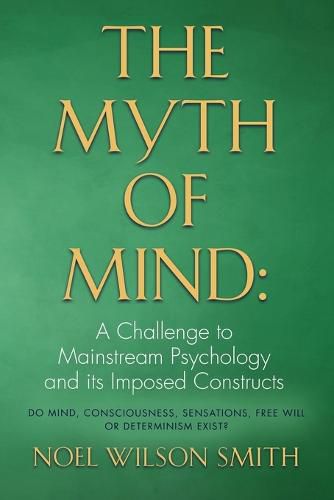Readings Newsletter
Become a Readings Member to make your shopping experience even easier.
Sign in or sign up for free!
You’re not far away from qualifying for FREE standard shipping within Australia
You’ve qualified for FREE standard shipping within Australia
The cart is loading…






This title is printed to order. This book may have been self-published. If so, we cannot guarantee the quality of the content. In the main most books will have gone through the editing process however some may not. We therefore suggest that you be aware of this before ordering this book. If in doubt check either the author or publisher’s details as we are unable to accept any returns unless they are faulty. Please contact us if you have any questions.
The first chapter of THE MYTH OF MIND examines the characteristics of constructs and events and provides criteria for examining the four topics each of which has a chapter. These chapter topics are (a) mind-brain, (b) consciousness, © freewill-determinism, and (d) sensation. These four topics are a source of major contentions in psychology. The sixth and final chapter consists of a review and conclusions.
Throughout the book, interbehavioral field psychology is given prominence as a system that can obviate many of the problems of psychology. It treats psychological events as interrelations of organism and surroundings that comprise the causal factors in behavior rather than assuming that the organism or its brain is self-caused and carries the entire weight of explanation. It also remedies the failure of biological orientations to recognize that while brain is a necessary condition as is environment, neither is a sufficient condition.
The aim of THE MYTH OF MIND is to provide psychologists with an alternative to mainstream approaches and to show how an approach starting investigation first with observations of events in nature rather than with traditional constructs can lead to a more scientific and effective orientation to both research and application.
$9.00 standard shipping within Australia
FREE standard shipping within Australia for orders over $100.00
Express & International shipping calculated at checkout
This title is printed to order. This book may have been self-published. If so, we cannot guarantee the quality of the content. In the main most books will have gone through the editing process however some may not. We therefore suggest that you be aware of this before ordering this book. If in doubt check either the author or publisher’s details as we are unable to accept any returns unless they are faulty. Please contact us if you have any questions.
The first chapter of THE MYTH OF MIND examines the characteristics of constructs and events and provides criteria for examining the four topics each of which has a chapter. These chapter topics are (a) mind-brain, (b) consciousness, © freewill-determinism, and (d) sensation. These four topics are a source of major contentions in psychology. The sixth and final chapter consists of a review and conclusions.
Throughout the book, interbehavioral field psychology is given prominence as a system that can obviate many of the problems of psychology. It treats psychological events as interrelations of organism and surroundings that comprise the causal factors in behavior rather than assuming that the organism or its brain is self-caused and carries the entire weight of explanation. It also remedies the failure of biological orientations to recognize that while brain is a necessary condition as is environment, neither is a sufficient condition.
The aim of THE MYTH OF MIND is to provide psychologists with an alternative to mainstream approaches and to show how an approach starting investigation first with observations of events in nature rather than with traditional constructs can lead to a more scientific and effective orientation to both research and application.